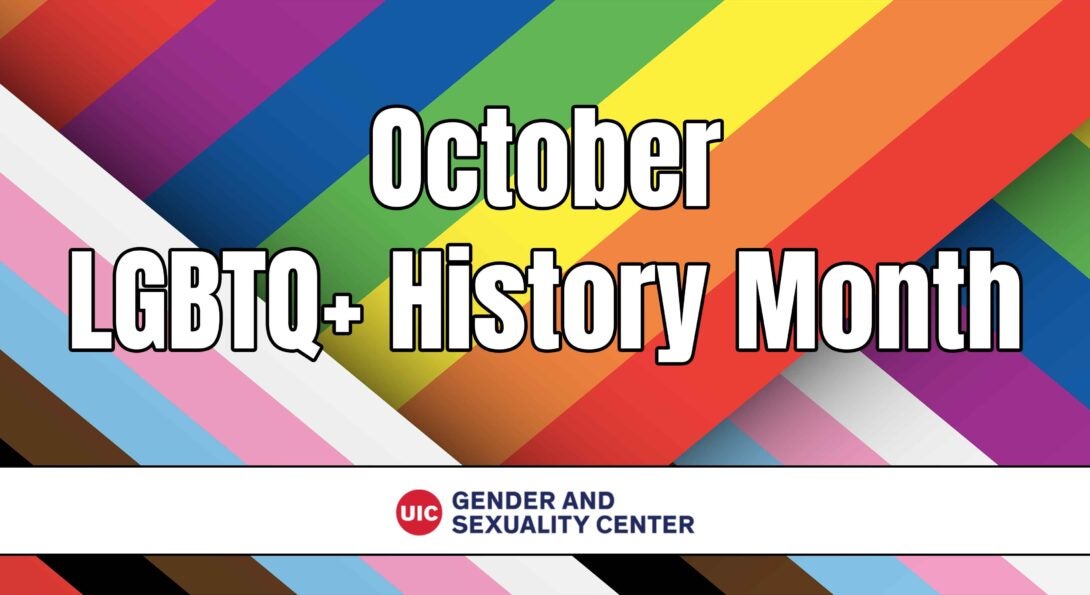Billy’s Banter: Reflections from GSC Director (October)

On LGBTQ+ History Month and (Not) Coming Out
LGBTQ+ History Month received its first mainstream media coverage in 1995, the same year the Gender and Sexuality Center (then called the Office of Gay, Lesbian, and Bisexual Concerns) was founded at UIC. (Drop by the GSC in BSB 181 and 183 to explore LGBTQ+ history from the mid-1990s and today).
Developed by high school history teacher Rodney Wilson, the first out Gay K-12 teacher in Missouri, the purpose of LGBTQ+ History Month is to provide role models, contribute toward building community, and recognize LGBTQ+ contributions. It’s difficult to overstate the risks Wilson faced in advocating for the publication of LGBTQ+ histories in the mid-nineties. He persevered because, in his words, “LGBT history gave me self-confidence as a gay person and strengthened my resolve to live, as best I could, an honest, open, and integrated life.” Nonetheless, Wilson was met with a severe backlash from conservatives who feared teaching LGBTQ+ history would endanger children. As the pendulum of history continues to swing, this backlash should sound familiar today in the wake of “Don’t Say Gay” bills, LGBTQ+ book bans, and attacks on Trans children and their families. LGBTQ+ History Month is just as important now as it has ever been.
October was chosen for LGBTQ+ History Month in part because National Coming Out Day was already celebrated every year on October 11. In this post, I want to talk about (not) coming out. It might seem counterintuitive that a GSC Director would talk about (not) coming out at a time in which our existence is under threat and visibility seems vital for our survival and flourishing. In fact, a need for more visibility was clearly communicated by students in their answers to Brick-by-Brick, the first LGBTQ2SIA+ student campus climate study conducted at UIC in twenty years. In response, the GSC created a faculty/staff Out@UIC list to increase visibility of LGBTQIA+ faculty and staff at UIC, to foster community building, and to help students find support and mentorship. Coming out can be empowering and it can help empower others to understand and treasure their own identities and desires.
Coming out, however, is more complicated than many understand. At the GSC, we were conflicted about developing the Out@UIC list because we know that coming out is a privilege and not all our LGBTQIA+ faculty and staff are safe to come out in every department and unit. Despite anti-discrimination policies, we know that we still live in a heterosexist and cissexist society that is not left behind when we arrive on campus. From blatant hate speech to not having a bathroom to use to encountering homophobic Chick-fil-A in Student Center East, we hear stories every week from LGBTQIA+ faculty and staff who experience harm on our campus. Most faculty and staff understand coming out as contextual and have the life experience to weigh the benefits and potential consequences of disclosure. Many of us are out to some and not out to others. As publicly Trans and Queer as I am, I’m not even out to everyone everywhere.
Many of our students are exploring and discovering their desires and identities and contemplating coming out for the first time. Days of celebration, like National Coming Out Day, communicate to students that they should be out to everyone all the time. My experience tells me that this is a potentially dangerous idea. Every semester, the staff at the GSC meet students who struggle to pay tuition or even afford housing because they came out to their parents and have been subsequently disowned. We meet students who are bullied and face very real violence in residence halls. We hear of International trans students who would like to change their names, but they know this might follow them when they return home, and they might face violence there.
Coming out and “pride” are often taken to stand in opposition to hiding in shame. I disagree. I claim that we understand (not) coming out as a powerful mode of survival. It can even be a form of resistance. In response to the Red Cross’s “Gay blood ban,” many Gay men chose to donate blood and hide their identities in righteous resistance. Trans and Queer theorist Jack Halberstam argues that we can learn from feminism and queer of color critique that “…it is white Gay male shame that has proposed ‘pride’ as the appropriate remedy and that focuses its libidinal and other energies on simply rebuilding the self that shame dismantled rather than taking apart the social processes that project shame onto Queer subjects in the first place.”[1] I call on my LGBTQ+ community at UIC to be thoughtful about when and where to come out. I call on our supporters to understand that a student, faculty, or staff member who is out to you, might not be out to everyone, and to hold that disclosure with care. Most important, I call on all of us to address the structural constraints on our campus and in our world that make us choose our survival over disclosure to begin with.
[1] J Halberstam, "Shame and white gay masculinity," Social Text 23, no. 3-4 (2005): 224.